Factory simulation helps Scottish confectioner hit the sweet spot
Background
Aldomak is a Glasgow-based confectionery manufacturer. The family-run business prides itself on its handmade recipes, which have been passed down through generations to bring customers a variety of sweet treats, including Scottish tablet, fudge and macaroon.
Challenge
To accommodate a growing product range, Aldomak recognised the need to integrate a degree of automation into production processes to complement its handmade recipes.
However, the team at Aldomak are focussed on fulfilling orders and day-to-day production, providing little opportunity to step back and asses the potential impact of changes or enhancements to manufacturing processes.
What did NMIS do?
Funded by an RTO grant through Innovate UK, the team at NMIS created a digital simulation of Aldomak’s fudge production line to support future decision-making and investment plans, using Siemens’ Tecnomatix Plant Simulation software.
The digital model draws on a range of data including the capacity of the machinery, inventory levels, and work schedules to help calculate the most efficient ways of working. Information was gathered using a mixture of information supplied by the business and a 3D scan of the factory using specialist laser technology.
The digital team at NMIS identified potential bottlenecks and explored various ‘what-if’ scenarios, such as adding new equipment and modifying workflows. Engineers examined the capacity of boiling equipment and movement of both personnel and products within the factory to establish how best to focus Aldomak’s efforts to boost efficiency.
It was identified that the need for heavy lifting and transporting products from one area of the factory to another could be reduced by 20% if boiling and mixing processes were combined into one station – as well as reducing the risk of staff strains and injuries.
Impact
So far, the simulation has helped Aldomak to consider the changes needed to achieve increased output and efficiency. It encouraged the manufacturer to think differently, focus on bottlenecks, and explore various ways to increase throughput before considering major investments.
The simulation also revealed that by investing in boilers with a higher capacity than current equipment, Aldomak could see a potential 43% increase in throughput per shift, resulting in an extra 260 kilograms of fudge.
In future, Aldomak could also implement a similar real-time model to help monitor the production process more routinely or add extra data points to cover factors such as energy use to help boost sustainability. It could also be expanded to include new fudge production scenarios, as well as other production lines including Scottish tablet and macaroon.

Dario Riccomini, managing director at Aldomak, said:
While our focus is still on our products being handmade, there are great opportunities to use new technology to change the way we work. In recent years our output volumes and revenue have grown, but we are always keen to explore new systems and processes that can aid further expansion. By combining small improvements and targeting our investments, we could significantly increase our manufacturing capacity, which may lead to new commercial contracts and wholesale orders.
“The project with NMIS was our first introduction to using manufacturing simulation and, as well as seeing the measurable benefits of the model, it highlighted the potential impact of collaborating with researchers to take Aldomak and our products to the next level.”
